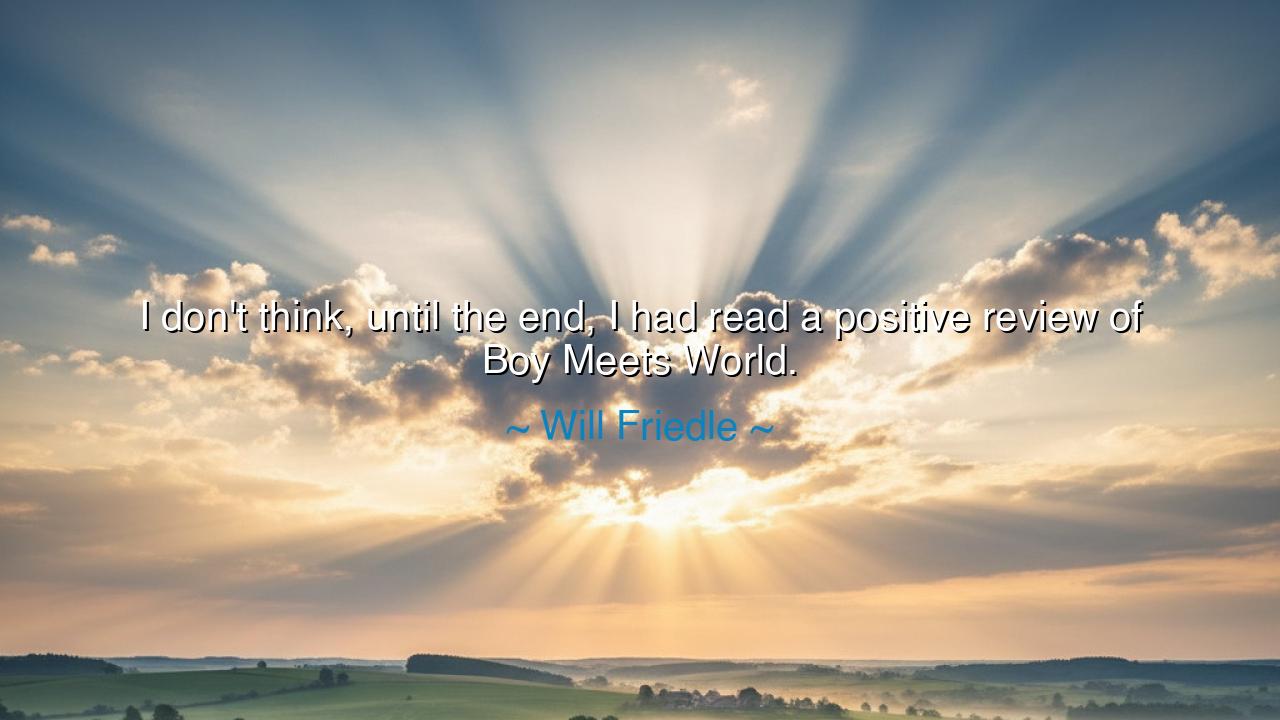
I don't think, until the end, I had read a positive review of






The words of Will Friedle—“I don’t think, until the end, I had read a positive review of Boy Meets World”—bear witness to an ancient and enduring truth: that the judgment of critics is not always aligned with the heartbeat of the people, nor with the lasting value of a work. In his lament, one hears both sorrow and defiance, for here is an actor who poured his spirit into a tale beloved by generations, yet found himself deprived of recognition by those who wield the pen of opinion. This is the cry of countless creators across time: to labor under the scorn of the few, yet find glory in the love of the many.
The ancients spoke often of the fickleness of reputation. Herodotus wrote of kings whose names were cursed in their own time, yet honored as heroes centuries later. Friedle’s confession echoes this same rhythm: neglect by critics, devotion by audiences, vindication in the end. Thus do we learn that the eyes of official recorders are often clouded, and that the true measure of art lies not in reviews, but in the enduring warmth it leaves in the hearts of those who encounter it.
Consider the tale of Vincent van Gogh, who painted the heavens with fire and fields with eternity, yet sold almost nothing in his lifetime. Critics dismissed his brushstrokes as madness, and society cast him aside. Yet today his work is celebrated as a window into the soul of humanity, commanding reverence and awe. Just as Friedle did not see positive reviews until the final days of the show, so too van Gogh never saw the praise that history would later shower upon him. The lesson here is profound: greatness is not always crowned in its own age.
And yet, there is beauty in this struggle. To create without applause, to act, to sing, to paint, to labor when the world offers no praise—this is the truest form of devotion. It is the essence of integrity, the unshakable fire of purpose. Friedle’s words remind us that one must not rely upon the fleeting judgments of newspapers and journals, for they change like the wind. Instead, one must hold fast to the work itself, and to the silent gratitude of those touched by it.
There is also in his voice a heroic triumph, for though the critics withheld their blessing, Boy Meets World endured. It entered the hearts of millions of young souls, shaping their laughter, their friendships, and their memories. When the curtain closed, it was not the reviews that remained, but the affection of those who had grown up with the story. This teaches us that the true measure of success is not written in ink, but in memory, in love, and in the invisible bonds forged between creator and audience.
So what lesson shall we take, O seekers of wisdom? It is this: when you labor in your craft, whether it be art, teaching, leadership, or love, do not set your eyes only on the praises of critics. Their words may not reflect the true worth of your work. Instead, look to the fruit of your efforts, to the lives you touch, to the enduring ripples that flow outward from what you have built. Remember, it is possible to live unseen by those who judge, yet deeply seen by those who matter most.
Therefore, let your actions be guided not by the hunger for acclaim, but by the fire of purpose. If the critics mock you, endure; if they ignore you, persist; if they misunderstand you, remain faithful to your craft. And should recognition never come in your time, let it be known that you labored for truth, for beauty, for the shaping of souls. For as Friedle’s words remind us, what is dismissed today may one day be remembered as timeless.






TNNgoc Bao Tran Nguyen
This quote highlights the tension between artistic validation and audience appreciation. Friedle seems to suggest that critical reception wasn’t affirming, yet the show became iconic. I wonder how this experience shaped his attitude toward future projects. Does encountering consistent negative reviews early on affect an actor’s confidence, or can it build resilience and determination to connect with viewers rather than critics?
MQNguyen Minh Quang
I think Friedle’s statement emphasizes resilience in the face of criticism. Despite not reading positive reviews, the show went on to succeed and gain a loyal fanbase. This makes me curious about how he personally interpreted criticism—did he see it as a learning opportunity or just noise? It’s an interesting reminder that external opinions don’t always align with the impact and value of creative work.
DNDuong Nguyen
Hearing this makes me reflect on how subjective television criticism can be. Friedle’s experience shows that critical reviews don’t always predict a show’s lasting influence. I wonder how much early criticism affected marketing or network support for Boy Meets World. Also, did the negative reviews motivate the cast to improve, or were they largely ignored? It’s fascinating to consider the role of critics versus audience in shaping a show’s legacy.
YNYen Ngoc
I find it surprising that a show like Boy Meets World, which has clearly had cultural impact, struggled to receive positive reviews. Friedle’s comment makes me think about how early criticism can shape an actor’s perception of their work. Did he feel discouraged by the critics, or was he able to focus on the positive response from viewers? It highlights the importance of measuring success in multiple ways.
VOTuong Vy Official
This quote raises questions about the disconnect between critics and audiences. Friedle seems to suggest that the show didn’t receive critical acclaim initially, yet it became beloved over time. It makes me curious about whether negative reviews ever influenced the cast or production choices. Do you think creators should prioritize critical reception or audience engagement when evaluating a show’s success?